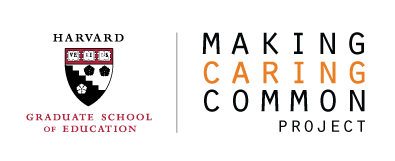This document, intended for letter recommendation writers (especially school counselors and teachers), focuses on writing “character-conscious” letters of recommendation.
Read MoreSort by topic
- Bias
- Bullying
- COVID
- CSN
- Caring and Empathy
- College Admissions
- Educator Resources
- Elementary School
- For Educators
- Gender
- Mental Health
- Moral and Ethical Development
- Relationship Mapping
- Romantic Relationships
- School Culture and Climate
- Sexual Harassment and Misogyny
- Social - Emotional Learning (SEL)
- Social-Emotional Learning (SEL)
- Talking Across the Aisle
- gender bias
This resource is intended for high schools that want to share better, more helpful information about student character with college admission offices. It provides high schools with general information and promising strategies regarding character assessment practices.
Read MoreJust released! A new online version of our popular Circle of Concern strategy. Use it to help children — and adults — develop greater empathy.
Helping students develop greater empathy is essential for building a positive school climate, but equally important is considering who students have empathy for.
Read MoreHow can high schools shape a college search and application process that promotes rather than undermines ethical character? What are key ways that high schools can reduce harmful achievement pressure and promote equity and access that advance the recommendations in our first Turning the Tide report? We offer the following guideposts.
Read MoreCaring and compassion are vital, teachable skills with the power to promote tolerance and inclusiveness in our schools, communities, and neighborhoods. This fun, three-part series has been designed to inspire and empower children to be ambassadors for good beyond their immediate friends and family.
Read MoreTo help educators learn how to build empathy in their school communities, Making Caring Common reviewed existing research on empathy and the strategies of evidence-based programs that promote it. Our work shows that there’s more to developing empathy than simply asking students to “walk in someone else’s shoes.” In this resource, you’ll find steps you can take to build real empathy in your students and your community.
Read MoreHow can we inspire and teach young people to care about and take responsibility for others, to think clearly about and pursue justice, to stand up for important principles?
Research suggests that developing these key moral capacities is not achieved via one-shot class assignments or brief programs but through sustained commitment and reflection within the context of peer and adult relationships. Yet children rarely engage in either substantial ethical activities or reflection, guided by adults who stand for important moral values, or even dialogue about how to live those values day to day.
Shared experiences and rituals can tie together school and community as places that value care and commitment and play a vital part in fostering a moral identity in students. Over the course of a semester or an academic year, the Caring Community Youth Capstone supports young people’s ethical development and builds a positive school culture where young people are responsible for creating a caring community.
Read MoreThe School Climate Committee is a key mechanism for creating positive social norms, for reducing bullying, and for developing more respectful, caring children. It also gives students agency in creating positive social norms.
A growing body of research supports the key role of school culture and social norms in preventing a wide array of social and emotional problems and promoting the development of caring, responsible, and respectful children. As children enter adolescence, they are especially influenced by social norms — by what other teen’s consider important, by how other teens define who is and is not worthy of concern, and by how other teens gain power and respect.
Because students primarily take signals from other students about social norms and what is ethically acceptable, and because students have inside knowledge about social dynamics, it is mainly students—especially acting together—who can change norms. This School Climate Committee strategy is one way to channel student power and influence in their school community.
Read MoreAs children get older, they face ever more complex situations that can be difficult to navigate.
Particularly salient are moral or ethical dilemmas, which concern issues of fairness, justice, and caring. These are decision-making problems without definitive right or wrong choices that affect other people as well as the self, and thus, they are fruitful exercises in moral reasoning.
With this light-lift strategy, students will practice evaluating and constructing moral or ethical dilemmas to get them thinking critically about others’ perspectives and feelings in challenging situations. Students will reflect on their own judgments of others and the importance of context, and what they themselves could do in challenging times.
Currently, our What Would You Do? strategy is available to schools in our Caring Schools Network. Reach out to Glenn Manning, Senior Program Coordinator at Making Caring Common to learn more about Caring Schools Network.
Read MoreStorytelling is a powerful tool for eliciting emotion and curiosity. It can be especially valuable in prompting students to reflect on their own identities and values, and to recognize that despite people’s differing stories, we all share commonalities. Stories are a great reminder that we are all human and that we are all capable of bridging difference through understanding and connecting emotionally with others.
With this light-lift strategy, students will identify and investigate their personal set of values and what/who matters to them. Students will use these values to guide the telling of (and making sense of) their own story. Using Chimamanda Adichie’s TED Talk “The Danger of a Single Story” as a guide, students will then learn about real people’s stories, particularly those often marginalized or misunderstood. Finally, students will make connections between their own and others’ stories to appreciate the similarities and differences in their values.
Currently, our Story of Us strategy is available to schools in our Caring Schools Network. Reach out to Glenn Manning, Senior Program Coordinator at Making Caring Common to learn more about Caring Schools Network.
Read More






